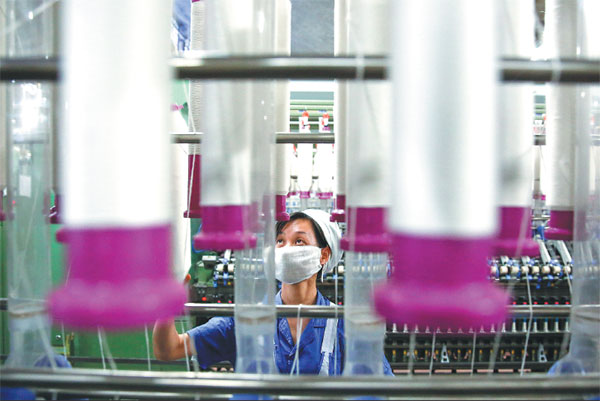SOEs stress risk control

Nation has put deleveraging of enterprises high on its agenda, a financial work conference says
BEIJING - SOEs will take the lead in controlling debt level and containing the leverage ratio, and will further accelerate the clearing of "zombie enterprises," the Xinhua News Agency-run Economic Information Daily reported, citing a source with the State-owned Assets Supervision and Administration Commission.
At the end of the first quarter, the leverage ratio of nonfinancial companies rose to 157.7 percent from 155.1 percent at the end of last year, according to the National Institution for Finance and Development. SOEs were responsible for about 60 percent of total corporate debt.
To curb risks from fast corporate debt expansion, China has put deleveraging of SOEs high on its agenda, according to a national financial work conference.
"The commission has attached great importance to risk control in central SOEs, and risk prevention provides a solid foundation for stabilizing growth," says Shen Ying, the SASAC's chief accountant.
To reduce the leverage ratio, the SASAC has encouraged enterprises to optimize capital structure via public offerings on the stock market and has supported efforts in asset securitization, she adds.
As an important means to reduce SOE leverage, debt-to-equity swaps have been accelerated, allowing companies with long-term potential to exchange their debt for stocks, SASAC says.
So far, 12 centrally administered SOEs, including China Baowu Steel Group and China First Heavy Industries, have signed such swap agreements, which will help them deal with bad assets and reduce their debt burden.
Local SOEs are also making full use of this approach. Two coal companies in North China's Shanxi province signed debt-to-equity swap agreements in March with the local State-asset regulator and China Construction Bank, worth a total of 20 billion yuan ($3 billion; 2.5 billion euros; £2.3 billion).
The deal will not only reduce their leverage ratio, but also facilitate their industrial transformation and upgrading.
Some companies have already received the funding from such swaps, including Huaibei Mining Group and Henan Energy and Chemical Industry Group.
China should also intensify efforts to clear out weak businesses that are not viable, usually in industries with severe overcapacity and kept alive only with aid from the government and banks, according to the financial work conference.
Xinhua
| A worker operates a machine at a textile company in Baoji, Shaanxi province. Xinhua |
(China Daily European Weekly 08/04/2017 page29)
Today's Top News
- SOEs post stable revenue, profits in Jan-Nov
- First brew in Lhasa
- PLA fully capable of crushing secessionist attempts
- China holds central rural work conference
- President Xi to deliver New Year's message to ring in 2026
- Xi's diplomacy in 2025: Shedding light on a world at crossroads































